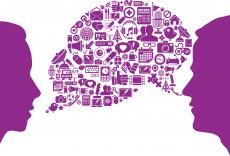
It is easy to think that true knowledge is almost an object that exists. It is something that you can either have or not have, but in fact, some suggest that knowledge is more a type of processing than anything else. Facts alone are not knowledge, since without context and understanding the importance of information, it means absolutely nothing.
Throughout the 20th Century, Jean Piaget developed a great deal of theory on how children learn and develop into adults. He believed that they were almost machines made to investigate the world and make connections, almost absorbing knowledge from their surroundings. Another developmental psychologist, Lev Vygotsky had different ideas. He believed that a child could not just absorb information without anyone else’s influence. He posed that a child had to be taught, and that social and cultural experience was just as important in development of knowledge as other experiences were, since in absence of these things, a child would not be able to understand normal society.
However, as the cognitive revolution became more and more prominent across the field, Bruner a supporter of cognitive ideas, attempted to explain psychological development of knowledge in his own way, and it is his ideas that are most widely accepted today. He believed in the ideas of those above, but suggested that even with others telling a child information, that child would not understand the information represented without being able to see its relevance to the world around them. Bruner therefore believed that the knowledge that is learnt is more of a form of processing by the brain. We learn this processing as we develop so that as adults we are able to understand the world without guidance.
He suggested that this information was useful since it suggests that a good teacher should not teach their students facts, but should teach them the ability to question the world around them and work out these facts for themselves. For example, it is more useful to teach someone how to calculate their times tables than to just have them repeat them to themselves up to a certain number. The latter method will only enable them to know their times tables up to that number, while the former will enable them to work out all possible times tables. Bruner suggested that most of what is learnt is in fact skills which are then used to learn actual detailed factual information. In other words, our knowledge is ongoing, and we are always understanding more about the world and about individual topics in greater detail. Since this knowledge is always increasing, knowing can be seen as a continual process of improving upon our understanding of the world.
We must not attempt to learn by simply remembering what we are told, but must learn how to go out and understand the world ourselves, since only this way can we understand the relevance of anything we learn. Context-less facts mean nothing. Furthermore, we must not take what we are told for granted, but must question the knowledge of others in order to continually improve on human understanding of the world.
Image from: http://wearefuturegov.com/wp-content/uploads/2013/06/image_gallery-1.jpeg

0 Comment:
Be the first one to comment on this article.